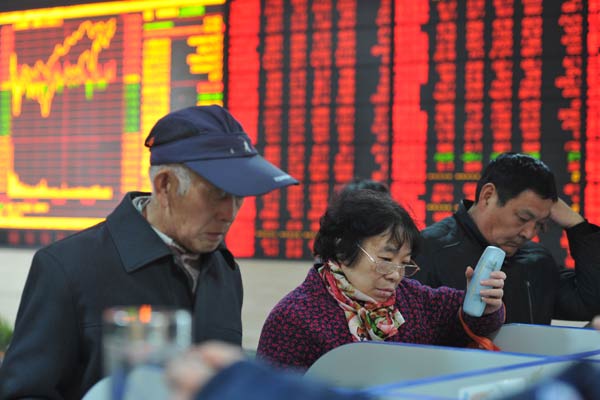 |
|
Investors examine share prices at a brokerage in Fuyang, Anhui province. The benchmark Shanghai Composite Index has surged nearly 40 percent from the start of this year, making it the best-performing globally. AN XIN/CHINA DAILY |
You are totally out of touch if you do not talk about stocks these days in China. The bull run on the mainland equity market and the perceived wealth effect that goes along with it have made it hard for even the least-interested investors to remain aloof.
The chance for small investors to become a little wealthier has never seemed better, at least for the past seven years. The benchmark Shanghai Composite Index has surged nearly 40 percent from the start of this year, making it the best-performing globally.
The value of shares changing hands on the mainland each day has been hovering around a record level of 1 trillion yuan ($162 billion), far surpassing the figure recorded on the New York Stock Exchange and suggesting massive capital inflows, the basis for any bull market.
The spring of China's equities market has arrived, enthusiastic pros claim, with many pointing to a benchmark high of 4,000 or even 5,000 points in the coming year, up from about 2,900 at present.
"The only limit is your imagination," one famous financial blogger wrote.
Many are answering the call, rushing to brokerage firms to open new stock-trading accounts. In the first week of December, nearly 600,000 accounts were opened, the most in nearly five years.
People have short memories: Few seem to remember when the bear last showed its claws.
Yet not many people can claim to be winners this time. The bull market took them by surprise, because all fundamentals suggested just the opposite would happen.
The economy is witnessing the slowest growth in six years, dragged down by over-capacity and a sluggish real estate market.
Manufacturers are caught in a downward spiral, with the Producer Price Index remaining negative for 33 consecutive months. Commercial banks' bad loans are increasing at an unprecedented pace, with the nonperforming loan rate standing at a five-year high of 1.16 percent in the third quarter.
The recent bull run has little, if any, foundation in the real economy.
These concerns made me skeptical, and I thus missed the latest rally led by big-cap, blue chip stocks of banks, brokerages and insurers. The temptation was huge, though.
People like to say that rare and implausible events occur "when pigs fly". This time, even "elephants were levitating", because of the heavy-weight stocks' huge market capitalizations.
My mistake was to see the stock market as a barometer of the country's economic health, which has never been the case. Otherwise, how to explain that until very recently, the benchmark index was at the same level as in 2000, even though China's economy has grown 10-fold in that time.
The latest rally bears strong hallmarks of government policy support, from targeted quantitative easing to the lifting of restrictions on home buying, from the launch of the Shanghai-Hong Kong Stock Connect program to a surprise cut in interest rates.
A seven-year bear market had virtually eliminated the mainland bourses' role as a source of funds. The government needs a bull market more than ever to deepen reforms and achieve economic restructuring.
So what we are witnessing is a State-orchestrated bull market. The huge amount of capital involved in sending index stocks skyward could not possibly have come from small investors.
Why not seize the opportunity?
If you are still hesitating, here is a piece of advice.
In this market you do not have to buy and hold, as value investors are supposed to do. All you have to do is take the pulse of government policies and speculate on them. To use a Chinese phrase, you have to" stir-fry" stocks, getting in and cashing out quickly.
Instead of fundamentals, all that matters is a concept, regardless of whether it will materialize.
And this market has never seen a shortage of "concept stocks" being touted to buoy sentiment.
From urbanization to new energy, from opening free trade zones to building economic circles encompassing major cities, stocks related to these concepts have brought fat returns to those who were quick enough to chase the trend.
If I am right, the concept of the Silk Road Economic Belt and 21st Maritime Silk Road-two initiatives proposed by China to promote regional integration and facilitate trade on the Eurasian continent and in the Pacific and Indian Ocean regions-will continue to intrigue the pundits.
Yet the question is how long the bull will run. Based on global experience, returns on stocks are still closely correlated with corporate growth and innovation, not just concepts.
That may explain why bull markets in China never last more than two years, compared with as many as 17 years on Wall Street.
So for small investors who are betting the farm on the market, and putting the funds they have saved for their children's education or their retirement on the line, they are facing enormous risks. They have to remember that the party never lasts long in China, and the chance to get out while they are ahead can evaporate at any time.
It is just naive for anyone to think that he can forever win in a money game where the majority are destined to lose.
Like the old stock market saying goes:" Bulls make money, bears make money, but pigs just get slaughtered."
